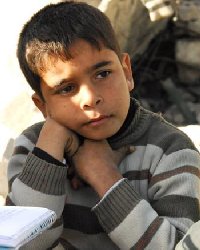Steve Matthews, an aid worker with World Vision Canada, has been to some of the world's most violent and troubled regions, including Darfur, Afghanistan, and Iraq.
But even after years in the field, Matthews still has difficulty comprehending the devastating affects of war on children. In February, he returned from Gaza, where he had spent a month listening to Palestinian children describe in graphic detail what they saw, heard and felt during this winter's Israeli airstrikes.
The 22-day ground and air operation, which Israel launched in late December, killed 1,300 people and injured thousands, about half of them civilians, including children. But a true accounting of the injuries suffered by the children of Gaza may never be known, says Matthews, noting that the horror of the bombings has left countless numbers of kids psychologically scarred.
"They've seen horrible things, like bodies that have been blown to bits," Matthews told CTV.ca from London, Ont., recalling the stories Palestinian kids told him during his month-long trip to the area.
"They have endured violence. They've witnessed violence. And in many cases they've lost a brother, sister, father."
In an effort to help the kids salvage their childhoods -- and cope with psychological and emotional impact of the bombings -- World Vision is now conducting what it calls "psychosocial interventions" in Gaza. The projects aim to help about 2,200 kids by giving them safe places to play and recover with the help of counselors and educators.
Counseling is essential if the children are to overcome the trauma they continue to endure, Matthews says.
"A part of understanding what you've been through is to express it ... so there is a sense of a shared experience -- so you know you're not alone," he says.
Matthews says the stories he heard from the children in Gaza are heart-wrenching. He recounts the story of one nine-year-old boy, Ameer, who had been hiding out with his family during one of the Israeli airstrikes.
Ameer's uncle wasn't able to duck for cover in time, and his legs were sliced by incoming ammunition. He survived after Ameer's father and another uncle ran out to a courtyard to save him -- but they ended up being killed themselves during the rescue.
Ameer didn't see their deaths, says Matthews, but he knew something terrible had happened because his father didn't return. The family was too saddened to tell Ameer the truth, but after five days they let him know that his father was buried beneath a nearby tree.
They saw Ameer later, "at the tree trying to dig up his father's body with his hands," Matthews says.
Lasting impact
Stories like Ameer's are unfortunately all too common at the Gaza Community Mental Health Program, says Husam el Nounou, the organization's communications director.
"This war has the characteristic of being so harsh in creating post traumatic stress disorders. So many of the children are experiencing nightmares, bedwetting, fear of darkness. They're clinging to their parents (and have) feelings of anxiety. These are the major issues after the war," el Nounou told CTV.ca from Gaza.
The problems may not be just short term, he says. El Nounou points out that the Israeli bombings have created strong, negative and long-lasting emotions among many Palestinian youth. That, he says, could end up perpetuating the region's cycle of violence through acts of vengeance against Israelis in the future.
"They will have for sure psychological problems that have to do with frustration and violence. And the violence will be one of the major consequences on these children," he says.
"I am concerned because of the deep feeling of being traumatized -- and because of a feeling of a continued threat, they feel like they want the revenge."
El Nounou says the counselors and educators at his organization try to reach kids before their psychological trauma turns into rage.
"We try to reconstruct the thinking of children -- to think about constructive activities and behavior ... but we have a whole generation affected, one way or another."
Matthews says each child's reaction to the violence they witnesses and experienced will be different.
"Clearly there are going to be a lot of outcomes. Some (of the kids) are going to be angry. Some are going to be empathetic. Some are going to be destroyed by it," he says.
"It's unthinkable that children should have to experience this type of horrible situation."
PHOTO CAPTION
Ameer, a 9-year-old in northern Gaza whose father was killed from aerial fire as he tried to save his brother who had also been hit with bullets, in this undated photo.
Source: commondreams.org


 Home
Home Discover Islam
Discover Islam Quran Recitations
Quran Recitations Lectures
Lectures
 Fatwa
Fatwa Articles
Articles Fiqh
Fiqh E-Books
E-Books Boys & Girls
Boys & Girls  Ramadan
Ramadan Fatwa Audios
Fatwa Audios Month of Mercy
Month of Mercy Women
Women Eed Al- Fitr
Eed Al- Fitr Food Recipes
Food Recipes Videos
Videos

 Prayer Times
Prayer Times












